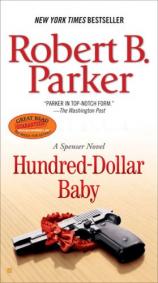Hundred-Dollar Baby
Review
Hundred-Dollar Baby
In the early 1970s Robert B. Parker transformed and invigorated the
mystery genre when he introduced a wisecracking, noble-hearted,
tough guy Boston private detective named Spenser. HUNDRED-DOLLAR
BABY is the 34th installment in the Spenser series.
A lot has happened over the three decades since Spenser first
arrived on the scene. Even the Red Sox finally won a World Series.
But Spenser is still Spenser. And while Parker has branched out and
introduced two excellent new mystery series in recent years and
even wrote a western or two, the arrival of a new Spenser novel is
a true cause to celebrate for longtime fans.
For make no mistake about it...Spenser now ranks right up there
with Chandler's Marlowe and MacDonald's Archer as one of the
greatest detectives in American literary history.
Longtime fans of the series such as myself can now mark periods of
our lives by what Spenser story we were reading at the time. And
for those fans, HUNDRED-DOLLAR BABY will rank among the classic
Spenser novels. For those who have never read one of these books,
this will serve as an excellent introduction to the series and the
essence of Spenser.
What makes this a wonderful story is the introduction of a
character from two earlier novels. Spenser came to the aid of April
Kyle in the 1982 novel, Ceremony. April was an abused runaway
working the streets as a prostitute. Spenser got her off the
streets and into the care and service of a high-class New York City
madam at the end of that book. A few years later he had to rescue
April again, this time from an abusive boyfriend.
When April walks into Spenser's office this time, he has not seen
her in years and doesn't even recognize her at first. She is
elegant, charming and seemingly "integrated." She is still involved
in prostitution, but now has moved up to "management" by running a
high-class bordello in a mansion in Boston's Back Bay.
But she has a new problem. Some men are trying to muscle in and
take over her business. Of course, Spenser and Hawk are right on
the case.
This novel does not repeat the cliché of the hooker with the
"heart of gold," but you do get to see the detective with the
"heart of gold." Spenser feels responsible for putting April in the
life all those years ago, although he points out that he had no
other good choice at the time.
So, of course, he will not charge her and goes right to work
rousting the tough crew from Southie that is interfering with
April's business. Spenser and Hawk easily accomplish the task. But
Spenser is also interested in April's life. "You're still trying to
save me, for christsake," April tells Spenser at one point. And he
is.
This is where HUNDRED-DOLLAR BABY moves into classic Spenser
territory. It raises the question of whether it is ever possible to
save somebody. Or as Susan, a shrink and Spenser's longtime
significant other, says, "Under stress, the damage usually
surfaces."
Things get complicated when the boss of the crew trying to muscle
in on April is found shot dead in his office. Even though his job
for April is over and he is not getting paid, Spenser keeps doing
what he does best. He says, "Maybe I'll just nose around until I
stumble over a fact or something."
He soon discovers that everybody is lying to him, and April is
hardly as innocent as she claims.
As with all Spenser novels, this one moves along at a fast pace.
There are all the elements we've come to expect, perfectly
written.
There is the great Hawk. Spenser says, "It was as if nothing
interested him, as if he saw nothing and heard nothing. Except that
later, if it mattered, it would turn out that he had seen and heard
everything."
Then there is the relationship between Susan and Spenser, with
neither of them wishing "to be an obligation." They have the most
intense discussions about psychology and love and the effects of
pornography and prostitution. But it is all done in a non-heavy
way, such as when they are celebrating Valentine's Day at the Four
Seasons by reading the poems they wrote for each other. Spenser
wonders what people will think when they find these poems after
they are gone.
"‘That we were foul-mouthed, oversexed and clever,' Susan
said.
‘Not a bad obit.' I said."
The poems themselves would make for a great Spenser
novel.
Finally, there is Spenser. He says at another point, "I looked like
I always do: insouciant, roguish and quite similar to Cary Grant,
if Cary had his nose broken more times." And there are other
hilarious scenes, such as when Spenser gets to interview a group of
women who may be called "the desperate housewife hookers."
But in the end, this is a Spenser novel that comes to a shattering
and startling climax, unlike any in the series. This is an ending
you will never forget.
As in life, the mystery genre conditions us with the fiction that
justice prevails and there can be some semblance of a happy ending
for all our stories. Life does not work that way.
As one of our greatest living writers, Robert B. Parker knows that.
With HUNDRED-DOLLAR BABY, he transcends the mystery genre
completely and has given us a great work of fiction.
Reviewed by Tom Callahan on January 22, 2011











